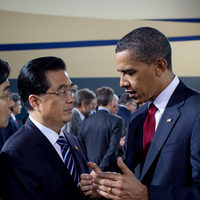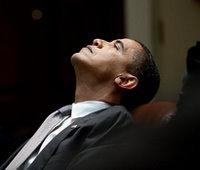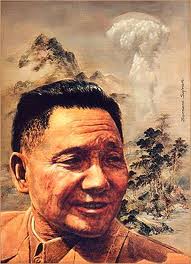
[EXTENSION OF ARGUMENT AT BOTTOM; VARIOUS UPDATES BOLDED THROUGHOUT]
Mubarak's just-announced decision not to stand for re-election in the slated September poll is obviously a good one, but so is his vow to remain in office until a successor is installed.
Why?
I just like how the paired decision allows the relevant authorities (i.e., the military) to slow things down, while demonstrating it's largely in charge without having to really step out there and harm any numbers (thus decredentializing itself). The breather also gives all the relevant outside parties time to influence events to their - sometimes yes and sometimes no - reasonable liking. It also gives the military time to interact with outside powers in a manner that should be reassuring.
We're talking a leaderless revolt that's driven by an underlying socio-economic revolution long in the making but weak in the developing of suitable political leadership. Carpetbagging Mohamed ElBaradei [who must now dump on the US every chance he gets to prove he's really Egyptian and not just a lifelong UN bureaucrat, otherwise known as electioneering] actually needs time in-situ to develop a real following, for example. And the Muslim Brotherhood's intentions and capabilities are more easily gauged/managed by the Powers That Remain in the run-up to the election than if something was slapped together, unity government-wise, in the immediate aftermath of Mubarak high-tailing it to Saudi Arabia.
As much as the romance of that image attracts ("See! We scared the old bastard out of office!"), the subsequent dynamics are rarely so good. This is a political system that's purposefully been retarded in its development for decades now, so giving it 8 months to find its feet will be a good thing.
Yes, much depends on how Mubarak behaves in the next few days and months (and seeing the social network sites back up is a VERY good sign), because the right moves will placate and soothe and the wrong ones will only inflame. People on the street need to be satisfied that they've triggered something huge and permanent and that a new political era has already dawned. Once that shock is over, then the real bottom-up networking and organizing can proceed apace, the key thing being that the police and Interior Ministry stay out of the picture.
That's not to say that I wouldn't expect the military to sanction some serious repression of the Brotherhood if they proceeded to scare people, but in general, it would be best if everybody had their chance to prove themselves under the new conditions without anybody being declared off-limits. A truly free election where the Brotherhood does okay but somebody far more stabilizing wins the presidency would be a huge victory for democrats everywhere and a severe blow to Iran, al-Qaeda, radical Islam in general, and even the vaunted China model and its alleged transferability to places like Egypt.
Plus, given America' leadership-from-behind to date, the interregnum gives the Obama administration some time to make amends. [Now, Obama, in catch-up mode, demands Mubarak leave right now, and if the military can live with the interim choice, so can I. But I'm against the general vibe of accelerating the pace out of fear of the mob, as I imagine the Army is - for good reason. I think that if you fear the Iran 1979 scenario, you want this to be as calm and orderly as possible, so you exploit Mubarak's decision the best you can, in consultation with the military, and you don't just pile on now for the sake of cleaning up your johnny-come-lately mistakes.]. The lag likewise makes possible the international mediation process, if that's welcomed and usefully applied in this instance (and I think it could be).
Done well, this becomes another Big Bang-like notch in our belts, proving that regime-change doesn't have to come at the barrel of the foreign gun but can be opportunistically achieved in concert with globalization's natural advance. Also done right, the flow of money to remake the Egyptian economy isn't in the form of official developmental aid but foreign direct investment - from all sides in a true collaboration-of-civilizations mode.
The best outcome of the election is a new president able and willing to make the right investment climate happen (so think legal and security and social tolerance in addition to economic and political stability) so globalization can flood in far faster and provide the jobs and opportunities and brighter future these protesters truly desire.
In short, I think this whole thing has gone amazing well. It should be embraced by a down-in-the-mouth West and United States in particular, because this is very much our side winning. This is globalization's connectivity fomenting revolution and leading to even more connectivity and self-empowerment. Overall, a huge positive that should be celebrated and nurtured for the profound demonstration effect.
Imagine: just 8 short years after we go into Iraq we face the prospect of that country and Egypt presenting the world with democratically-elected governments. I know everybody wants everything by Tuesday, but to me, looking at it strategically from a longer-term perspective, I can't believe how well things are turning out in this globalization-versus-radical-Islamic-fundamentalism struggle - or how quickly.
[per the comment on the Big Bang reference--see below, understanding that I'm taking on the notion here, not the commenter per se]
You don't argue that Iraq directly caused Tunisia and Egypt. That's silly, but so is Wilkerson's hatred of all things Bush. The guy went round the bend years ago. Saying there's a direct causality is like saying we descended from modern apes. I'm citing a larger phenomenon that begets both, one that presents us with different challenges, if we so choose to recognize them.
You argue that they're all part of the same process of opening up the Middle East to globalization. Sometimes it makes sense to force the issue, and sometimes it's better to act opportunistically.
["Really? I thought one size supposedly fit all!"]
Iraq was kinetic because Saddam was a big-time disconnector who required an enemy-world image to justify his amazingly cruel rule. No such effort is required with either Tunisia or Egypt because there, you're not talking a totalitarian ambition (Saddam failed), nor a required world-enemy justification for militarism and constantly threatening behavior to others. Simply put, not enough boxes were checked, and in Mubarak's defense, he did plenty to help out US interests in keeping the region stable, so even some boxes that could have been checked were left unmarked (and yes, we call that "realism," boo hoo!).
Where we do draw parallel lines between the two is this: by taking down Saddam, we triggered a larger tumult in the region. We triggered all manner of accelerated connectivity, in part because we told the world we'd be responsible for regional stability by taking down its worst, most destabilizing actor and standing up to #2 in Iran (which we've done consistently, and thankfully haven't invaded given our tie-down elsewhere and the related arguments I've long made that Iran is a soft-kill option staring us in the face). We saw the rippling tumult in 2005, when the Saudis held local elections for the first time in 70 years, Lebanon broke somewhat free of Syria in the Cedar Revolution, Mubarak felt the need to conduct a somewhat freer election, etc. Governments across the board felt some need to either firewall or prove their reform credentials, and Iraq helped fuel that by saying, Change is coming one way or the other.
[And then we got unduly obsessed with Iran's nuclear pursuit, which I have also criticized ad nauseum. And Obama has persisted in this painfully myopic view of the world and globalization.]
Of course, and I've made these arguments ad nauseum, we could have done Iraq better, but the realist in me concerning the Pentagon and the US military says that the small-wars mindset wasn't going to emerge until we failed using the old "lesser includeds" techniques (big war force pretends to have small-wars skills). Bush held off on that shift for way too long (until the people spoke in 2006) and now big Blue (Air Force, Navy) are dying to revive it all vis-a-vis China, which I think is nuts. But evolutions such as these are non-stop fights, and so those of us who believe in them continue that struggle. But that's a side issue to this argument.
And that larger argument remains: globalization is impinging on a part of the world that is not ready for it and will experience tremendous social, economic, political and security tumult as it absorbs its impact. That penetration process is not some elite conspiracy in the West; it's a demand-pull primarily by youth and middle class and students - and oppressed women - locally. When it's impeded enough by evil elites, and those elites constitute security threats in addition, the US calculus will always broach the question of kinetically removing them to facilitate the process ("global capitalist domination" to the neo-Marxist bullshit artists, liberation of an emerging global middle class to me). Sometimes the threshold is met, but most times it is not. Why? We're too busy with other things. We're feeling down on ourselves. We're experiencing crisis. Or it's just not enough of a me-versus-him feeling to justify whipping ourselves into action, which is just how democracies are (and God love them for that).
But does that mean we don't intervene? Of course we intervene. Just get your head out of your butt and realize that interventions aren't all the same. Some are kinetic and some are very subtle. We're intervening right now plenty in Egypt via our contacts with the military, a very broadband connection spanning decades and thousands of officers (and a process I know well, having been involved with it on many levels for two decades--see PNM for my description vis-a-vis India/Pakistan). That is an unknown but huge power of the Leviathan force: we train people all over the world. And so, when stuff goes down, we have influence.
Will this influence somehow get us everything we want? When we want it? With praise ringing in our ears? Again, let's stay out of fairyland. Lumps will be coming, as will brick bats. Only question for us is, 8-10 years later, do we like the outcome? Did our side win?
In Iraq, come 2013, we're looking at a very good situation. A democracy with a handful of free elections by then. Iranian influence, but not much more than Turkey's (and it's the economics where both matter, not the politics). A rising oil power that shifts the balance in OPEC away from Iran to a country that has cooperative investment deals with basically every continent in the world--connectivity! In the end, we still could have done it vastly better, like simply giving the Chinese the entire rebuild contract on day 1 instead of our supremely bad fumbling effort (Check out China preparing to dump $10B into Zimbabwe). We could have gone COIN from day one instead of 3-4 years in, wasting the vast bulk of our lives and the vast bulk of the Iraqi lives. And yes, we hold Bush-Cheney accountable for such decisions, but the mistakes were throughout the system, products of decades of assumptions and thinking that many of us still battle to this day. But, in the end, the Iraq that stands there in 2013 is something entirely different from what the pessimists have long predicted. It is a force that makes globalization move more broadly and deeply in the region, and that means we win.
My hopes for Egypt are that, by 2020-2022, we're looking at a Turkey-like player with a broad and relatively happy middle class. It's got a military that's respected and still a very solid friend of the US and the US's friends in the region. It is Islamist in flavor, because that's the people's heritage and it must be respected, just like a Christian-Judeo one is in the US. But it's not unduly dominant or nasty to other faiths, because that's bad for globalization and business. It becomes a conduit for the Horn and North Africa and the PG - connecting in all directions.
And sooner than you think, it becomes the justification for similarly successful unrest elsewhere.
But yeah, we're now in the business of nation-building in Egypt, and fortunately for us, this time the US won't be in charge. I hope we learn how much better that can be, and how many more players we can and should help tap right from the start, encouraging the Egyptians to self-empowering connectivity in all directions, so long as they create and sustain the rule sets necessary to make that work.
So to sum up: my argument here is not to wash away Bush-Cheney's many mistakes. I'm on record and in books and articles and columns and speeches and posts galore listing all the things they did that I disagreed with. My point here is to remind us of the larger connections with history - a history we purposefully sought to create and continue to try and shape.
And to remind you that our side is globalization, and globalization is winning - big time.
So wake up, Austin Powers*, and realize the world has shifted - yet again - in our favor, just when we needed a lift.
And then keep your chin up through all the name-calling to follow. Stick to the long-term perspective, because the dumbasses will be freaking out, bemoaning yet again how "America lost and THEY won!" It's just our self-critical and Type A nature, which is good much of the time and just plain silly at various stretches of perceived and real crisis.
Simma down, nah!
Basil Exposition: Austin, the Cold War is over!
Austin Powers: Finally those capitalist pigs will pay for their crimes, eh? Eh comrades? Eh?
Exposition: Austin... we won.
Powers: Oh, smashing, groovy, yay capitalism!
 Wednesday, July 13, 2011 at 12:17AM
Wednesday, July 13, 2011 at 12:17AM  Fabulous op-ed in WSJ on 6 July by Liu Junning, an "independent scholar in Beijing."
Fabulous op-ed in WSJ on 6 July by Liu Junning, an "independent scholar in Beijing."


























